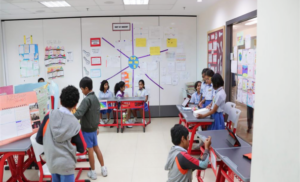Download our FREE Academic Calendar now! 📚 Start your child’s journey to success.
How do international schools stop environmental degradation? This question is at the centre of a movement where education is environmental responsibility. In times marked by climate change and ecological crises, it is imperative that educational institutions show the way forward through sustainable practices.
Environmental education at an early age can have a significant impact on children’s ability to make sustainable choices. International schools such as GIIS Noida are best placed to impart in young minds responsibility towards the planet.
Read on to find out how these schools are incorporating environmental consciousness into their curricular activities as well as other aspects of their schooling system.
Promoting Environmental Education in School Curricula
Deeper Ecological Awareness
Initiating green projects in education at GIIS Noida starts with deepening student’s ecological awareness. By having all subjects taught with reference to ecology, students will grasp the idea of complex interrelations within ecosystems.
GIIS Noida for example has come up with several programs aiming at helping students appreciate their footprint on the environment. Some of these programs include; interactive sessions with conservationists, field visits to nature reserves and project work-based learning on local ecological problems. By doing this, they can start appreciating how delicate our ecosystem is and also the value of protecting them.
In addition, this understanding enables students to make more informed choices about how they engage in interactions with the environment.
Empowerment and Community Involvement
Some examples include tree planting drives, clean-up campaigns and water conservation initiatives done under community service projects by learners. Apart from reinforcing what they already know about ecology these activities help build a sense of bonding among students as well as instilling responsibility in them.
Through partnerships with local non-governmental organisations concerned with environmental conservationism some schools carry out large-scale sustainability projects for pupils hereby enabling them to actively participate in the process of saving our planet. In this regard, students learn that it is through collective action that they can effectively address environmental issues.
Knowledge about Global Warming
Understanding global warming is vital to environmental sustainability. International schools are key in making climate change science less mysterious and highlighting its global nature. Schools have integrated studies on global warming into their curriculum so as to make the problem seem more serious and thus urgent for the students.
At GIIS Noida, students get to know how global warming comes about by use of simulations and workshops. These include concepts such as greenhouse effect, carbon dioxide impact on climate change, and alternative sources of energy where wind power is thought to be one way of reducing these effects. This information will serve as a motivation for the upcoming generation towards adoption of sustainable practices as well as technologies.
Stopping Forest Depletion
Forests play a very important role in ensuring good health for the planet — they provide oxygen, shelter for biodiversity species and resources used by man. Teaching learners about forest importance against deforestation forms part of environmental education.
In terms like biology or geography, international schools such as GIIS Noida stress the significance of forests within these institutions. For example, students study how forests act as sinks for carbon during biology classes while in geography lessons they learn why deforestation leads to climatic changes besides extinction trends among various species.
Hands-on Environmental Education
Perhaps hands-on education is the most effective tool for teaching responsibility towards the environment. It involves learning directly from one’s surroundings with an aim at improving them.
Young people should realise their involvement in these kinds of things such as growing gardens at school, determining the amount of energy used by their school buildings and reducing waste. In this way they are able to use what they have learnt and understand how their actions can affect the actual world.
Final Thoughts
Such global institutions as GIIS Noida are taking the leading role in environmental education promotion. These schools are molding students who are aware about environmental issues such as awareness on forest conservation, hands-on learning, global warming knowledge, community involvement and ecological consciousness into its CBSE curriculum.
For the finest CBSE schools in Noida that emphasise on environmentalism, GIIS Noida should be your first choice. Find out how this school is creating a paradigm shift from being aware to becoming an action oriented institution promoting sustainability for all people.
Also Read: Innovative Teaching Methods at CBSE International Schools: A Global Perspective

 Noida Campus
Noida Campus
































FAQs
1. What is environmental responsibility in schools?
Environmental responsibility makes a direct significant impact on the abilities of the students to make sustainable choices. It makes students aware of their responsibilities to reduce environmental wastage and protect the surroundings. Students become more conscious to make and sustain a happy and greener surrounding for a balanced lifestyle.
The top CBSE schools in Uttar Pradesh play an important role in helping students understand their environmental responsibilities. Schools like GIIS integrate environmental education into their curriculum and encourage various environment-related extracurricular activities for the students. By adopting regular sustainable practices, students not only protect the planet and surroundings but also become globally conscious individuals.
2. How do international schools promote environmental awareness?
The top international secondary schools promote environmental awareness in students with their consistent efforts and motivations. Schools can combine many engaging extracurricular activities and recycling sessions in their curriculum to keep students involved with environmental practices. Moreover, these efforts also make the students more aware about their responsibilities towards the protection of the surroundings.
The international schools can also use collaborative learning where students can learn sustainable practices using global platforms. Classroom discussions, projects, and environmental day celebrations also encourage students to become active participants in sustainable efforts. As students gain environmental awareness, they are more likely to become responsible individuals with a sense of responsibility and love for the surroundings and nature.
3. Why is it important for students to learn about sustainability?
The knowledge and awareness about sustainability makes students aware and conscious about the environmental challenges. By focusing on the importance of environmental protection and sustainable efforts, students can make more informed decisions to promote environmental balance. Moreover, it helps students become global individuals by connecting and understanding global environmental issues.
Learning about sustainability helps students to develop a sense of responsibility, love and care towards nature. They develop a mindset focused on the protection of the environment by reducing environmental wastage. Education about learning sustainability is much needed to make the present and the future generation of the global Montessori schools environment-friendly.
4. How can students take action for the environment at school?
Students can learn and understand about the on-going environmental issues by concentrating on the hands-on environmental education. This education makes students explore and learn about their responsibilities to nature. Learning about the available natural resources and their uses helps the students to understand how their actions can affect the surrounding world.
Students in the Noida CBSE schools can participate in recycling programs, nature awareness campaigns and tree planting events. They can also participate in the engaging eco-friendly competitions and environmental clubs to implement the green policies. Moreover, students can implement the general practices like reducing environmental wastage, switching lights and using energy-efficient appliances. These actions not only protect the environment but also make students proactive global individuals.
5. What role do teachers play in encouraging environmental responsibility?
Teachers play an important role to encourage students to actively participate in the environmental responsibilities. Teachers must make students aware about the importance and need of following such practices for a balanced, peaceful and greener surroundings. Additionally, teachers can talk about environmental issues and how the actions of the students can make a difference.
Moreover, teachers can encourage students of the higher secondary schools to participate in global environmental events. Teachers can use classroom discussions, available resources, and digital technologies to make students think about the environment. Environmental education should be integrated in the academic curriculum by teachers to develop a responsible attitude of the students towards nature.